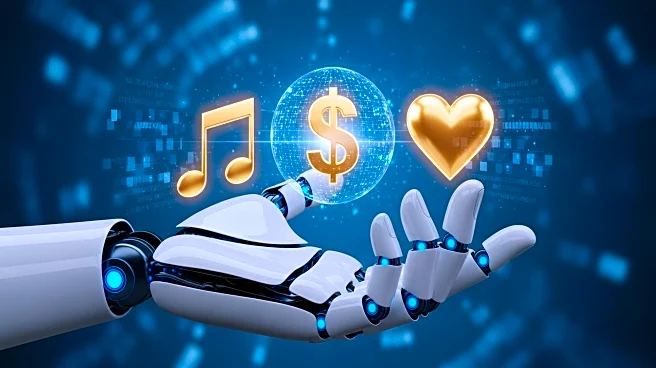What's Happening?
The potential burst of an artificial intelligence (AI) bubble is raising concerns about its impact on financial markets, particularly retirement funds. Prominent figures in AI, such as Sam Altman, have suggested that AI stocks may be overvalued, which could affect many retirement portfolios heavily invested in these companies. Additionally, AI is influencing personal relationships, with platforms allowing users to create customized virtual partners, leading some to prefer AI interactions over human dating. In the music industry, AI-generated content is stirring controversy, exemplified by the band The Velvet Sundown, which released albums entirely created by AI. These developments highlight the growing influence of AI across various sectors.
Why It's Important?
The potential overvaluation of AI stocks poses a risk to investors, particularly those with retirement funds tied to these companies. A market correction could lead to significant financial losses. In personal relationships, the rise of AI-generated partners may alter traditional dating dynamics, raising questions about the future of human interaction. The use of AI in music challenges traditional notions of creativity and originality, sparking debates about the role of technology in artistic expression. These issues underscore the need for careful consideration of AI's integration into society and its long-term implications.
What's Next?
Investors may need to reassess their portfolios to mitigate risks associated with AI stock volatility. In the realm of personal relationships, societal norms may evolve as AI companionship becomes more prevalent. The music industry might see increased regulation or guidelines regarding AI-generated content to address concerns about authenticity and intellectual property. Stakeholders across these sectors will likely continue to navigate the challenges and opportunities presented by AI's rapid advancement.
Beyond the Headlines
The ethical implications of AI in personal relationships and creative industries are significant. As AI becomes more integrated into daily life, questions about privacy, consent, and the nature of human connection will become increasingly relevant. The potential for AI to replace human roles in creative processes also raises concerns about the future of employment and the value placed on human creativity.










